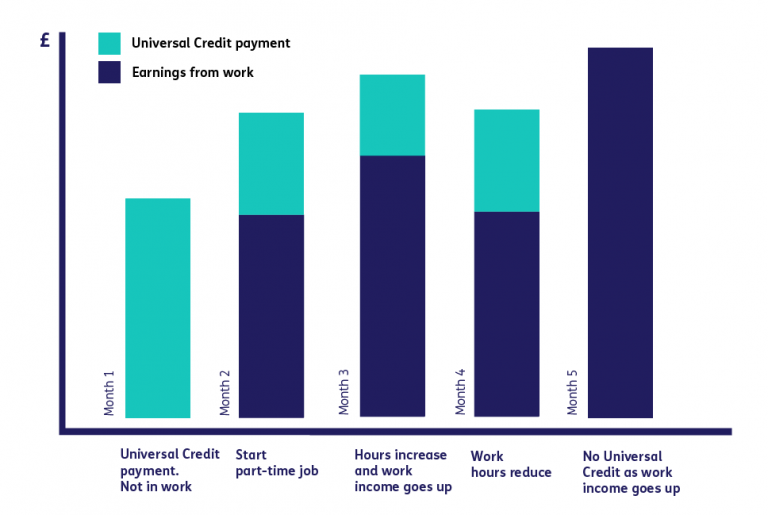Historical Universal Credit Payments: Are You Missing Out?

Table of Contents
Understanding Universal Credit and its Historical Changes
Universal Credit (UC) replaced six legacy benefits in the UK, aiming to simplify the benefits system. However, its rollout has been complex, with numerous changes to eligibility criteria, payment amounts, and the application process itself. Understanding these historical changes is crucial to determining if you might be owed back payments. These changes affect the calculation of UC arrears, meaning many could be entitled to backdated payments.
- Key dates of significant Universal Credit changes: The initial rollout began in 2013, with full national roll-out completed in December 2022. Key changes included alterations to the waiting period, the introduction of the minimum income floor, and adjustments to the taper rate (the rate at which benefits are reduced as earnings increase). These changes significantly impacted eligibility and payment amounts for many claimants.
- Examples of changes to eligibility requirements: Income thresholds have fluctuated, affecting who qualifies. Work requirements have also been modified, impacting those seeking employment or unable to work due to illness or disability.
- Impact of changes on payment amounts and frequency: Changes in the calculation methods, the introduction of 'conditionality' and sanctions have affected the overall payment amounts received by many claimants. The frequency of payments has also been a point of contention.
Understanding these historical shifts in UC is the first step towards identifying potential entitlement to back payments.
Identifying Potential Entitlement to Historical Universal Credit Payments
Determining whether you're entitled to historical Universal Credit payments requires careful examination of your past circumstances and benefit records. Many people miss out due to unawareness or difficulty navigating the system.
- Steps to check your payment history: Access your online UC account to review your payment history. Look for any periods where you believe your payments were incorrect or lower than expected.
- Resources for verifying your eligibility: The government website provides information and tools, including benefit calculators. Citizen's Advice Bureaux and other benefits advisors can also help assess your potential eligibility for UC arrears.
- Common reasons for missed or underpaid Universal Credit: These include changes in circumstances (such as a change in income or household composition) not being reported promptly, errors in the application process, and delays in processing changes.
By meticulously checking your records and seeking assistance if needed, you can significantly improve your chances of identifying potential backdated payments.
How to Claim Historical Universal Credit Payments
Claiming backdated Universal Credit payments involves a structured process. It’s crucial to gather the right information and follow the correct procedure.
- Required documents for a back payment claim: This typically includes proof of income, evidence of household composition, and any supporting documentation relevant to your circumstances during the period in question.
- The process for submitting a claim: The process usually involves contacting the Department for Work and Pensions (DWP) directly either by phone or in writing, providing relevant information and supporting documentation.
- The timeframe for processing the claim: Processing times vary, so be patient and keep records of all communication.
- How to appeal a rejected claim: If your claim is rejected, you have the right to appeal the decision. The process typically involves submitting a formal appeal, and you might need to provide further evidence.
Seeking Professional Advice for Your Universal Credit Claim
Navigating the complex world of Universal Credit claims can be daunting. If you find the process overwhelming or are unsure how to proceed, seeking professional advice is crucial.
- Benefits advisors: Citizens Advice Bureaux provide free, impartial advice on benefits and can assist with your UC claim.
- Legal aid: If you meet the eligibility criteria, legal aid might be available to support you.
- Debt advice: If debt is a contributing factor, debt advice charities can provide support and guidance.
Professional help can ensure you get the support you deserve and avoid common pitfalls in the claims process.
Conclusion
Claiming historical Universal Credit payments can lead to significant financial gains for many individuals. Don't let potential back payments go unclaimed. Check your eligibility today! Use the resources mentioned above, contact the DWP or seek professional assistance if needed. Don't miss out on your entitlement to Universal Credit; claim your historical Universal Credit back payments today! Visit the government website for more information and to begin your claim.

Featured Posts
-
 Ps Zh Proti Aston Villi Statistika Ta Rezultati Yevrokubkovikh Zustrichey
May 08, 2025
Ps Zh Proti Aston Villi Statistika Ta Rezultati Yevrokubkovikh Zustrichey
May 08, 2025 -
 Catholic Church Conclave A New Pope To Be Chosen
May 08, 2025
Catholic Church Conclave A New Pope To Be Chosen
May 08, 2025 -
 The Night Counting Crows Changed Their Snl Performance And Its Legacy
May 08, 2025
The Night Counting Crows Changed Their Snl Performance And Its Legacy
May 08, 2025 -
 The Long Walk Movie Stephen Kings Classic Brought To The Big Screen
May 08, 2025
The Long Walk Movie Stephen Kings Classic Brought To The Big Screen
May 08, 2025 -
 Psg Opens Doha Labs A Global Innovation Expansion Begins
May 08, 2025
Psg Opens Doha Labs A Global Innovation Expansion Begins
May 08, 2025
